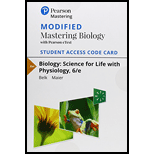
EP BIOLOGY:SCIENCE F/LIFE...-MOD.ACCESS
6th Edition
ISBN: 9780134839530
Author: BELK
Publisher: PEARSON CO
expand_more
expand_more
format_list_bulleted
Concept explainers
Question
Chapter 26, Problem 6LTB
Summary Introduction
Introduction:
Plants have evolved several strategies for reducing transpiration. These strategies fit into two general groups: (1) modifications to photosynthesis that make carbon dioxide acquisition more efficient, and (2) modifications to leaf shape and stomata placement that increase water conservation.
Expert Solution & Answer
Want to see the full answer?
Check out a sample textbook solution
Students have asked these similar questions
Vernalization is a plant response to: Light Gravity Physical contact None of the above
Plant epidermis secretes a waterproof substance called: Cuticle Wax Periderm covering Pectin
Plant transpiration accounts for what % of atmospheric water vapor? 50% 90% 5% 75%
Protects the plant and
prevents it from drying
out by means of a waxy
Select match
cuticle.
Provides support and
useful for food storage.
->
Select match
Thick walls allow them
->
Select match
to support the plant and
also allow it to be
flexible.
The brain and spinal
cord, which contains
special cells called
Select match
neurones.
Skeletal or striated
Select match
tissue connected to the
skeleton to help with
movement.
Tissue found on the
->
Select match
surface of the skin.
A mutation causes the vascular cambium in a plant to stop working. How does this impact cellular respiration?
The stomata would remain open and release water vapor.
The guard cells would remain closed and store water vapor.
The leaves would not be able to release glucose for energy production.
The xylem would not be able to transport water to the rest of the plant.
Chapter 26 Solutions
EP BIOLOGY:SCIENCE F/LIFE...-MOD.ACCESS
Knowledge Booster
Learn more about
Need a deep-dive on the concept behind this application? Look no further. Learn more about this topic, biology and related others by exploring similar questions and additional content below.Similar questions
- Figure 30.34 Which of the following statements is false? Negative water potential draws water into the root hairs. Cohesion and adhesion draw water up the xylem. Transpiration draws water from the leaf. Negative water potential draws water into the root hairs. Cohesion and adhesion draw water up the phloem. Transpiration draws water from the leaf. Water potential decreases from the roots to the top of the plant. Water enters the plants through root hairs and exits through stoma.arrow_forwardGround tissue in monocot stems performs the same functions as _______________ and _______________ in herbaceous eudicot stems. (a) phloem; xylem (b) cork cambium; vascular cambium (c) epidermis; periderm (d) primary xylem; secondary xylem (e) cortex; pitharrow_forwardStomata: Where on plants can Stomata occur? ÷ Central cylinder ÷ Leaf upper side. = Leaf lower side ÷ Unifacial leaves ÷ Root epidermis ÷ Root bark ÷ Stem epidermis ÷ Stem bark What is the function of stomata? ÷ How are the cells called that line the the stoma and determine its opening? 3. 4 What phyical factor determines the functions and dynamics of stomata? cytoplasm} PICK ONE OPTION ONLY: 1.) Yes OR No Sugar content in 2.) Conduction of water (with xylem) Conduction of sugars (with phloem) Gas exchange and regulation of evaporation Photosynthesis light reaction Photosynthesis dark reaction 3.) Bundle sheeth Chlorenchyma Guard cells Palisade parenchyma 4.) Cytoskeleton Vacuole water pressure Cell membrane electropotential Potassium concentration in the Vacuolearrow_forward
- Stomata are openings on plants that allow for gas exchange. True Falsearrow_forwardYou could prevent most of a plant's secondary growth by: Destroying the phloem portion of the vascular cambium It would require the combination of at least two of these Removing the apical or basal meristems Destroving the cork cambium Destroying the xylem portion of the vascular cambiumarrow_forwardWhich plant water movement process is dependent on transpiration? root pressure capillary action cohesion-tension all of the abovearrow_forward
- Which event would occur when guard cells are filled with water? gases cannot diffuse into the plant opening of stomata diffusion of sugars into the sieve tube members closing of stomata gases cannot diffuse out of the plantarrow_forwardDescribe the unique features of the following specialized roots in plants. What benefit do plants derive from this type of specialized roots: Pneumatophores Velamen Haustoriaarrow_forwardWhich of the following is not correct concerning plant xylem? The fluid (sap) in the xylem transports sperm and eggs throughout the plant. The fluid (sap) in the xylem transports water and ions. The fluid (sap) of the xylem moves from the roots toward the leaves of the plant. The xylem is composed of tubular cells that run throughout the stems and leaves of vascular plants.arrow_forward
- Which of the following processes enables a plant to extract nutrients from the soil? O Nutrient anions (sulfate, phosphate, nitrate, etc) are replaced by Cl on soil particles. Released nutrients become available in the soil water. Anions exchange places with cations during anion exchange, which confuses roots and turns HATS into LATS, after which the endodermis synthesizes a caspian endothelium O Cation exchange facilitates the breaking of covalent bonds between nutrients and soil particles O Protons replace nutrient cations on soil particlesarrow_forwardFrom environmental pressures to obtain and retain water, many plants developed to transport nutrients and water. Origid structures like branches and trunks seeds nonvascular tissues vascular tissues like xylem and phloemarrow_forwardThe mesophyll of the leaf -is sometimes found in roots or stems. -is mostly along the edges of the leaf. -is located between the leaf veins. -is exposed to direct sunlight. -is made up of palisade and spongy parenchyma cells.arrow_forward
arrow_back_ios
SEE MORE QUESTIONS
arrow_forward_ios
Recommended textbooks for you
 Biology 2eBiologyISBN:9781947172517Author:Matthew Douglas, Jung Choi, Mary Ann ClarkPublisher:OpenStax
Biology 2eBiologyISBN:9781947172517Author:Matthew Douglas, Jung Choi, Mary Ann ClarkPublisher:OpenStax Biology (MindTap Course List)BiologyISBN:9781337392938Author:Eldra Solomon, Charles Martin, Diana W. Martin, Linda R. BergPublisher:Cengage Learning
Biology (MindTap Course List)BiologyISBN:9781337392938Author:Eldra Solomon, Charles Martin, Diana W. Martin, Linda R. BergPublisher:Cengage Learning

Biology 2e
Biology
ISBN:9781947172517
Author:Matthew Douglas, Jung Choi, Mary Ann Clark
Publisher:OpenStax

Biology (MindTap Course List)
Biology
ISBN:9781337392938
Author:Eldra Solomon, Charles Martin, Diana W. Martin, Linda R. Berg
Publisher:Cengage Learning